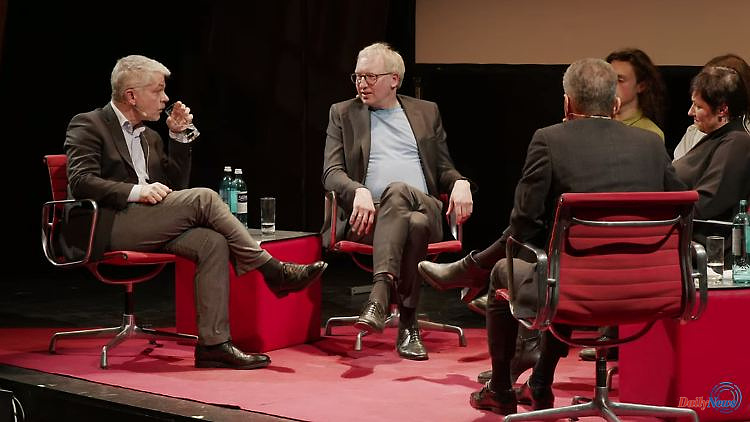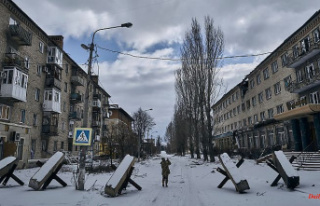One is for arms deliveries, the other against, both arguing with Europe's security. The reason for the different perspectives is a completely different view of Russia. In Frankfurt, political scientists Varwick and Masala argue publicly for the first time.
After almost an hour, Nicole Deitelhoff gets to the heart of the argument. Addressing Johannes Varwick, she says: "Your argument is: We must sacrifice Ukraine for European security. And Carlo Masala's argument is: We must defend Ukraine for European security."
In a series of events in Frankfurt called "Streitclub", which Deitelhoff runs together with the publicist Michel Friedman, the political scientists Masala and Varwick represent these two poles. They have already argued on Twitter, but not publicly. Discussion title: "Europe's security. Are we prepared for war?" But actually the main issue is whether it is right or wrong to help Ukraine in its fight against Russia, to supply it with weapons. (The discussion was broadcast on YouTube and can be found here.)
Masala sees it this way: "The security of Germany, the security of Europe is being defended in Donbass. Period." Russia's goal of destroying Ukraine is only one dimension of this war. Another is that Russia is waging a "war of order" in Ukraine. That means: With this war, Russia has destroyed the existing security order in Europe, it wants to create a new one. If that succeeds, "then Europe's security will be extremely destabilized over the next few decades."
Varwick, on the other hand, sees the West on a "slip slide" into increasing involvement in the war and the "escalation of dominance" on the Russian side. "Whatever we do, Russia is capable of taking it to a new level." The maximum escalation is the use of tactical nuclear weapons. That is unlikely, but it is "the sword of Damocles that hovers over the situation". In response to Friedman's question as to whether the nuclear power Russia would not be given all power if it were given a free hand, Varwick replies: "It's a dilemma that cannot be resolved."
The conditions for Varwick are not entirely fair: With Masala, Deitelhoff and Friedman, he is sitting opposite three people who find his position anything but convincing. But although it gets loud at times, although differences of opinion remain, the debate sums up what has been the subject of arguments in Germany for almost a year.
So Varwick sees the immediate blame for the war on Russia, but also a joint responsibility on the part of NATO. The reason: At their Bucharest summit in 2008, the alliance decided that Ukraine and Georgia should become NATO members. It was naïve to ignore Russia's "vital interests" in Ukraine.
Masala counters that the NATO decision of 2008 was a compromise with which Germany and France wanted to prevent Ukraine from being immediately admitted to NATO. The topic was then put on the back burner, "nothing has happened in terms of membership" since Bucharest. Shortly before the Russian attack on Ukraine, Americans and Europeans in Moscow "should have held hands" to assure Putin that Ukraine would not become a member of NATO. The West overlooked the fact that the Russians were not interested in NATO membership at all. "The Russians wanted a historic mission." Russia does not follow security policy considerations, but is pursuing "a neo-imperial project".
There is also a dispute over Varwick's "slide". "It's slipping to a point where we either have to accept the Russian targets with a high death toll or fully oppose them, and then ultimately with our own soldiers," he says. Deitelhoff contradicts: Nothing slips, the deployment of troops would be a decision - one that all NATO countries have categorically ruled out. Masala goes against the grain that Varwick is acting "as if Ukraine has no say in this issue". The vast majority of the people of Ukraine want to defend themselves against Russia. That doesn't mean that the West has to do whatever Ukraine wants. There is no automatism, no "slide".
It is a meeting of political scientists: Deitelhoff is a professor of international relations and theories of global order at the Goethe University in Frankfurt am Main and head of the Leibniz Institute Hessian Foundation for Peace and Conflict Research (PRIF). Varwick is also a professor of international relations and European politics at the Martin Luther University in Halle-Wittenberg. Despite all the arguments, he is on first terms with Masala. Since the beginning of the war, he has advocated the thesis that arms deliveries are wrong and that NATO is partly responsible for the Russian attack: "In this constellation, in which Russia is determined to do everything, arms deliveries will not change the balance of power, but only make the conflict bloodier and longer do," he said in March 2022 in a double interview with ntv.de. He has just signed Alice Schwarzer and Sahra Wagenknecht's "Manifesto for Peace," which calls for an immediate end to arms deliveries.
Masala is also a political science professor; he holds a chair in international politics at the University of the Federal Armed Forces in Munich. He sharply criticized the Schwarzer Wagenknecht manifesto: "The authors are not stupid, they know exactly what will happen if the arms deliveries are stopped, as they demand, and they knowingly and appreciatively accept it," he tweeted just before the discussion. Arms deliveries are aimed at "changing the Russians' military cost-benefit calculations" so that Russia is ready for real negotiations, he says at the "Streitclub" in Frankfurt. "Arms deliveries are the prerequisite for diplomacy ever having a chance in this conflict."
It is obvious that Varwick sees things differently - the dispute over arms deliveries is at the heart of the conflict. Deitelhoff wants to know from him how the negotiations called for in the "Manifesto" are to be carried out without Ukraine being thrown at Russia "to eat". For no answer, Varwick complains that those who support more arms shipments are not asked that question. "That's just not true," calls Masala with a noticeably increased pulse. And gives his answer: "Negotiations are being conducted on the status quo of war profits." Unfortunately, his intervention results in Varwick not having to answer the question.
Then there is the question of what compromises Ukraine would have to make in any negotiations. Varwick says Russia will keep part of Ukraine in a negotiated settlement. Where is the compromise, Masala wants to know. "It's not a compromise, Johannes, it's an accommodation for Russian interests."
Based on Varwick's assumption that arms sales are dangerous for Europe, Deitelhoff asks him if he is willing to "sacrifice Ukraine for Europe's security". Here, too, Varwick avoids a direct answer, replying that the conflict must be frozen. And adds that Russia is showing "incredible determination" and "incredible brutality that we can't counter."
Masala sees this as a "break in logic". If Russia is so determined, why should it be interested in freezing the conflict? The Russian perspective is: "We can still win, we can always conquer more. There's no freezing."
At this point it becomes clear that Varwick and Masala are talking about two completely different Russias. Varwick's Russia is open to rational considerations, Masala's Russia is pursuing neo-imperial expansion. "If Russia's goal were to destroy Ukraine's statehood, then we would have a disaster," Varwick admits, then a freeze would actually not be possible. "But I don't see that."
This is the central weakness of Varwick's argument. Putin has repeatedly made it clear that he believes Ukraine has made a historical mistake, that the war is intended to correct that mistake. Every day on Russian television it is said that Ukraine must be wiped out. There are reasons to call what Russia is doing in Ukraine a genocide. "Next time just invite an Eastern Europe expert," commented Eastern Europe historian Jan Claas Behrends on Twitter. "Or even better: a Ukrainian."












